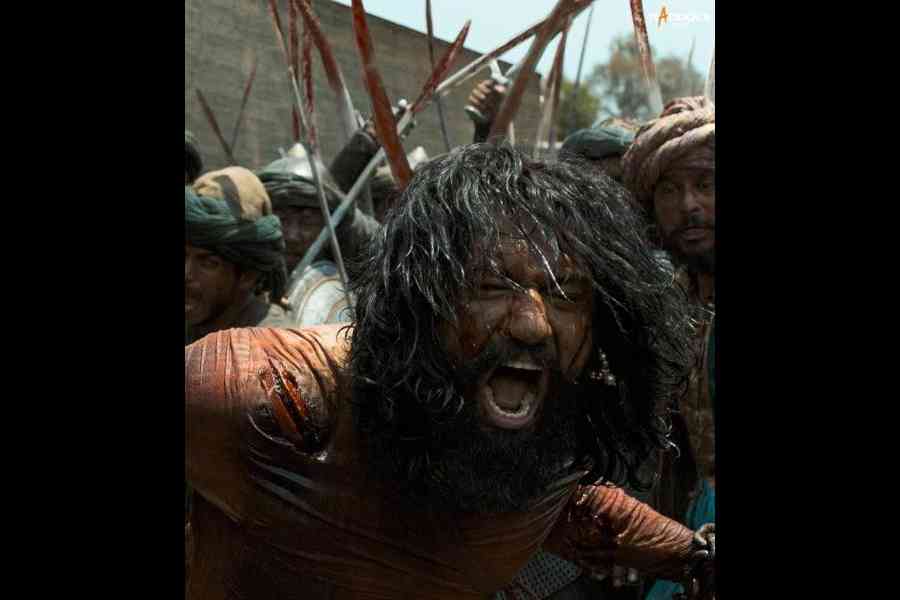The law of averages — that a brilliant father rarely gives way to an equally illustrious son — was turned on its head as early as the 17th century when Sambhaji took over the reins of the Maratha empire from his father, Chhatrapati Shivaji Maharaj. Chhatrapati Sambhaji Maharaj’s depiction in history — despite tales of his unwavering valour — are unfortunately sketchy. Even the name by which he was referred to — ‘Chhaava’ aka ‘lion’s cub’ — is more of a nod to Shivaji’s larger-than-life courage and persona. To cite an almost as-good-as-it-gets allusion, it refers more to Mufasa than it does to Simba.
Hence, the unsung story of Sambhaji, and his relentless fight against the Mughals, led by the “tyrannical” Aurangzeb, needed to be documented. Chhaava does that, with its source material being the eponymously named historical novel by Shivaji Sawant. Which brings us to the tricky question of how much of Chhaava — the book, and by logical extension, the film — is fact and how much of it is exaggerated fact? We will, perhaps, never know.
Chhaava hits the ground running. Aurangzeb — Akshaye Khanna buried under layers of prosthetics — knits away on his throne (Aurang, as he is referred to here, was known to knit his own prayer caps), and is informed joyously that Shivaji is dead and that the Maratha defence is finally down. Minutes later, Sambhaji, Shivaji’s eldest progeny played by Vicky Kaushal, and his men plunder the Mughal stronghold of Burhanpur. This is where the decibel levels of Chhaava kick off and keep rising several notches during the course of this 161-minute film.
Sambhaji ascending the throne after ravaging Burhanpur is a direct call for war to Aurangzeb, who spends the next nine years plotting and planning, and parking himself in Maratha land, but is unable to get even within sniffing distance of Sambhaji. The Maratha king, with his men outnumbered by the Mughals, resorts to clever tactics of warfare, using nature and topography as camouflage. At one point, dressed as women, the Marathas attack an army of Mughal soldiers in a dense forest. In another instance, they torpedo out of a water body. All of it makes for an adrenaline-pumping watch.
When he isn’t fighting, Sambhaji talks about love and philosophy with his ‘shri sakhi’ — wife Yesubai, played by Rashmika Mandanna, whose lines sound mechanical and rehearsed — even as he grapples to combat the enemy within. His stepmother Soyarabai Bhosale (Divya Dutta is left with little to do) conspires to put her own son on the throne. The third female character in the film — Aurangzeb’s daughter Zeenat, played by Diana Penty — is largely inert. Among the supporting cast, Ashutosh Rana and Vineet Kumar Singh, as expected, excel.
Director Laxman Utekar has earned his filmmaking stripes as a cinematographer and aided by Saurabh Goswami, the DoP of Chhaava, he ensures that the battle scenes are raw and visceral and often very, very violent. The combat sequences are choreographed well enough to give the impression that they are organically filmed, with a feeling of claustrophobia and chaos taking the audience in its grip. It isn’t comfortable, but also makes you marvel at its impact.
Chhaava slips into darker territory in the third act, with the scenes of torture reminding one instantly of Mel Gibson’s Passion of the Christ. The extended climax, though testament to the braveheart that Sambhaji was, is overlong and gruesome. Sambhaji’s roar ultimately becomes annoyingly loud, with A.R. Rahman’s background score adding to it. Chhaava is also one of Rahman’s weakest albums.
What ultimately holds Chhaava together are its two central performances. Akshaye Khanna inhabits Aurangzeb fully, with his silences (deafening and killing in equal measure) forming a much-needed contrast to the loudness of the rest of the film. The consummate actor that he is, Akshaye depicts both the brutality and the tired angst of Aurangzeb effectively through his body language.
Chhaava, of course, belongs to Vicky Kaushal, who plunges into the part and commits to it fully. Here is a chameleonic actor who can make any role his own and Vicky proves that here too. What he is let down by is the unidimensional writing of his character — very little of Sambhaji’s linguistic skills, his fondness for poetry or even his other exploits on the field or in administration, are captured in Chhaava.
The dream of ‘swarajya’ or a unified state not defined by religion is what motivated Sambhaji till the end. Four centuries later, that dream is, once again, under threat. Let’s honour the heroes of our history. But let’s also cast an eye on our present.










